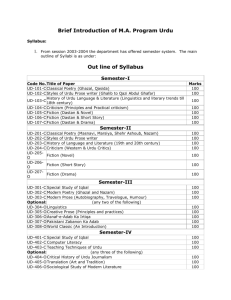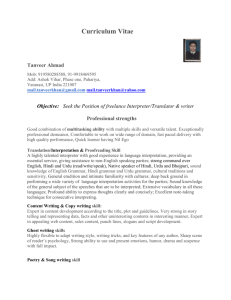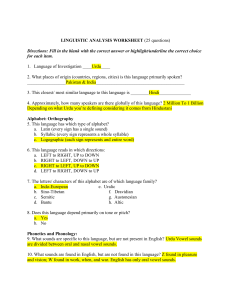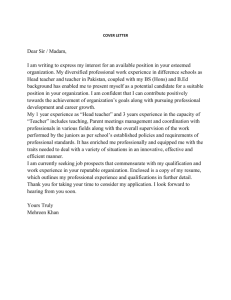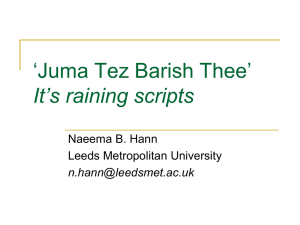Urdu 311 / **** 311 - University of Washington
advertisement
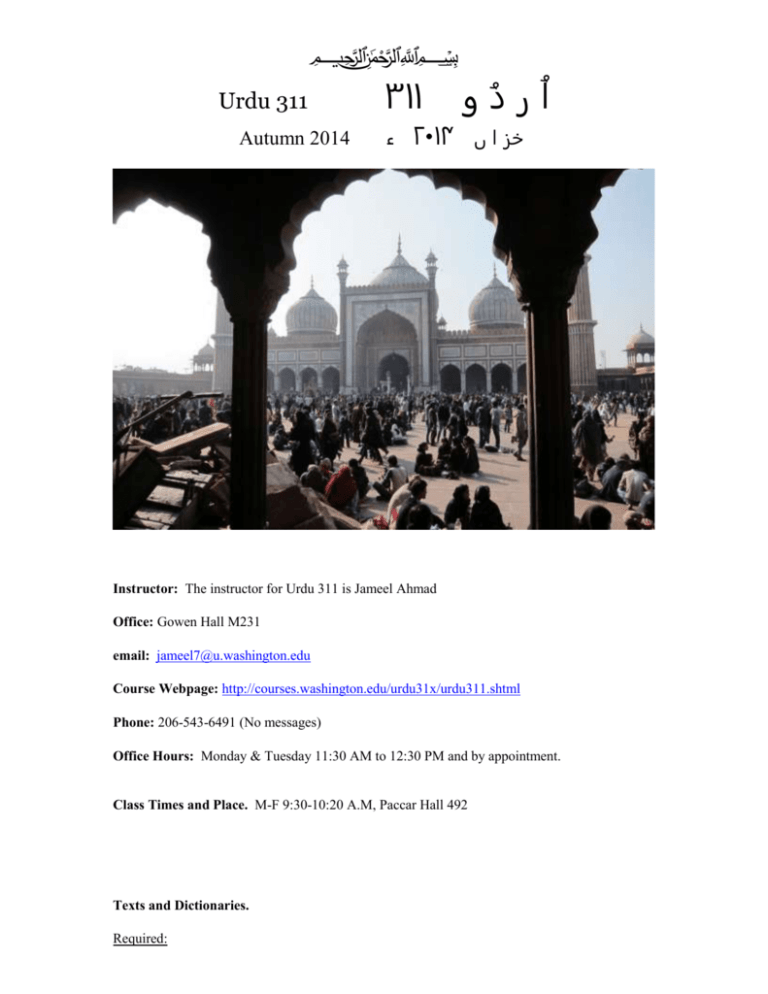
﷽ Urdu 311 Autumn 2014 ۳۱۱ُُُُاُُرُدُُو ُُُُ ء۲۰۱۴ُُُُخزُاُں Instructor: The instructor for Urdu 311 is Jameel Ahmad Office: Gowen Hall M231 email: jameel7@u.washington.edu Course Webpage: http://courses.washington.edu/urdu31x/urdu311.shtml Phone: 206-543-6491 (No messages) Office Hours: Monday & Tuesday 11:30 AM to 12:30 PM and by appointment. Class Times and Place. M-F 9:30-10:20 A.M, Paccar Hall 492 Texts and Dictionaries. Required: 1. Ali S. Assani and Syed Akbar Hyder: Let’s Study Urdu: An Introduction to the Script. 2. Ali S. Assani and Syed Akbar Hyder: Let’s Study Urdu: An Introductory Course Available at the University Book Store in the text book section of Asian Languages and Literature. Dictionaries: 3. Urdu into English: Standard twenty first Century Dictionary by Bashir Ahmad Qureshi. 4. English into Urdu: Standard twenty first Century Dictionary by Bashir Ahmad Qureshi. Or 5. Advanced twentieth century dictionary : English into English into Urdu : more than 35,000 words and 25,000 idiomatic phrases explained in simple easy-tounderstand language / rev. and enl. by Abdul Haq 6. Anjuman's Urdu-English dictionary = Anjuman kī Urdu-Angrezī lug̲ẖat / martabah Abdul Haq Ask instructor for dictionaries 3 & 4.Can buy online from Amazon or other sources. Sometimes these are available in one volume. Before buying online, please consult with the instructor. Dictionaries are not cheap. So make sure you are getting the right one. Online Urdu dictionaries: *English into Urdu dictionary: http://www.urduenglishdictionary.org *Excellent Urdu to Urdu and English dictionary. Most detailed and reliable Urdu dictionary available online: http://www.crulp.org/oud/default.aspx (Urdu Lughat )ارُدُوُُلغتfor later use. Other online resources such as course website, Language Learning Center (LLC) and Moodle etc. will be used for class. Overall Goals for Quarter and Year. A fundamental goal of the Urdu program at the University of Washington is the learning of Urdu in the Nasta’liq writing system. It has been found over the years that students’ progress in learning Urdu is enhanced greatly if they learn the writing system as quickly as possible and not approach Urdu through the Roman alphabet (which actually slows down progress in the language). As a result, the first two weeks of Urdu 311 are mostly spent learning the basic sounds of Urdu and the elements of the Nasta’liq writing system. For the Nasta’liq writing we will use Let’s Study Urdu volume of Introduction to the Script. It is only after the writing system has been learned that we move on to grammar, reading, writing, speaking, etc. Once we get going on our “regular” schedule after the first two weeks, class time is divided into sessions that deal with separate activities (i.e., conversation, drill, reading, listening, etc.). The main objective for the first-year Urdu course sequence (Urdu 311-312-313) is the enabling of students to develop usable proficiency in Urdu in each of a number of distinct skills, namely, speaking, reading, writing, listing, and knowledge of formal grammar. The primary text Let’s Study Urdu is designed in such a way as to enable students to develop their abilities with regard to each of these skills in a parallel manner. The primary text for the course is Let’s Study Urdu, which addresses each of the basic skills. The book contains 16 chapters plus appendices. We will complete all sixteen chapters of the book by the end of Spring Quarter and Chapter 6 or 7 by the end of Autumn Quarter. We will use the book in a comprehensive manner, which means we will be covering (and students will be responsible for) all grammar, conversations, readings, vocabulary, etc. Accompanying listening material is available with the book and in CD form and could be played on Real Player. Listening material is also available in the Language Learning Centre in the basement of Denny Hall and on their webpage. During the classes you will also learn about South Asian society in general and the etiquette and culture of the Urdu speaking community in India and Pakistan which affects the use of language in daily life. We will listen to and watch songs, ghazals and conversations, movie clips from Indian cinema (Bollywood) and other popular sources from Pakistan and India. Grading: The final grade for Urdu 311 is based on the following factors: Written homework assignments (25%); Weekly dictations (10%); Three Scheduled Class Tests and several pop quizzes (25%); Two-hour final examination (15%); Project Presentation (5%) Spoken Drills and Class Participation (20%). Your two lowest homework grades and the (one) lowest dictation score will be forgiven. There is no midterm examination. Policy on Late Homework Assignments Missed Quizzes and Related Matters. Each written homework assignment, quiz and dictation will be graded on a ten-point scale. Missing or unexcused late homework will earn a grade of zero. Makeup examinations will be given only under exceptional circumstances, such as serious illness (with documented proof), or death in the family, etc. All homework assignments are to be turned in at the beginning of class on the day due. Classes will begin promptly at 9:30 and students are expected to be in class on time. Students should take note of the dates of dictations, quizzes and examinations (including the final examination). Requests for the rescheduling of examinations are not granted. NOTE CAREFULLY THE DATE OF THE FINAL EXAMINATION. IT IS NOT PERMITTED TO TAKE THE EXAMINATION EARLY. Make your travel plans for the holidays accordingly. Policy on Handwriting. Neatness counts. You are expected to write all of your Urdu in an acceptable handwriting. In order to assist you in developing such handwriting, you are required to turn in all of your work on paper that has been ruled specially for writing in Nasta’liq. Each student is supplied with two sheets of this paper. Please duplicate one of these to obtain additional copies for doing your homework. These are also available on the class website, you can print from there. In addition, all homework is to be done in pencil, with no crossovers or cross outs (i.e., errors are to be erased and corrected). Homework written in unacceptably sloppy handwriting will be graded down. Students are advised to invest in a good eraser. Attendance and Student Responsibility. Students enrolled in Urdu 311 are expected to attend all class sessions and are held responsible for material covered in those sessions. It for any reason you are unable to attend a class session, it is your responsibility to find out from another student what was covered in that session and whether any assignments or instructions were given out while you were absent. Students registered for Urdu 311 are strongly advised not to miss a single class at least during first two weeks (script learning) or else it would be very difficult to catch up with the rest of the class. Attendance will be taken in each class. Enrollment Restrictions: Because it is quite possible that students enrolled in Urdu 311 may already have some exposure to or proficiency in Urdu, it is important that the University of Washington policy concerning taking language courses at the first and second-year level be understood. This policy reads as follows: First-year (elementary) or second-year (intermediate) foreign-language credit is not granted either by examination or by course completion in a student’s native language. “Native language” is defined as the language or one of the languages, spoken in the student’s home during the first six years of his or her life and in which he or she received instruction through the seventh grade. Students who misrepresent the extent of their background so as to gain entrance to a course at the elementary or intermediate level may be dropped from the rolls of that course. Students who have questions as to whether they are prohibited from taking Urdu 311 according to this policy should speak with the instructors so as to obtain a suitable placement in an Urdu course at the appropriate level.
